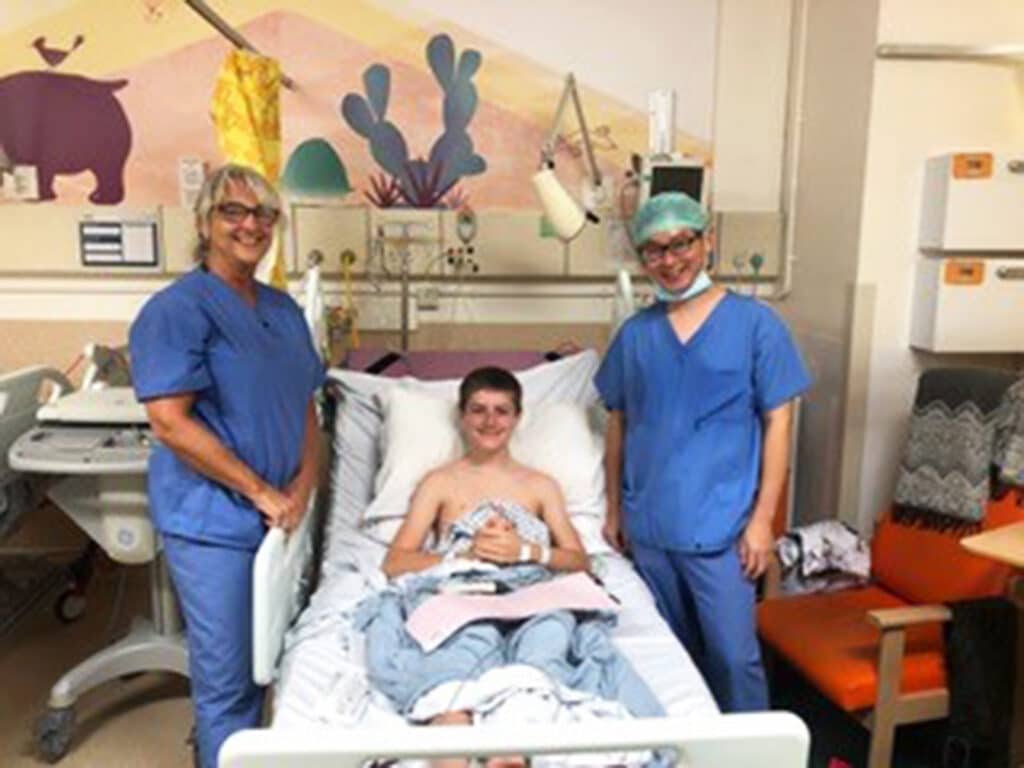With the start of National Heart Month 2021 rapidly approaching now that February is only a few days away, here at CRY we felt it was really important to flag up and share a positive story that hit the national press just before Christmas.
14-year-old Finn Mason’s recent experience is a timely reminder – most importantly for the wider general public who might not be aware of CRY or our mission to prevent young sudden cardiac death – of just how vital cardiac screening is for young people.
The two full-page articles, published in both the Daily Express and Daily Mirror on Tuesday 15 December, featured an in-depth interview with Finn’s mum, Niki – as well as giving CRY’s Chief Executive, Dr Steven Cox, the opportunity to explain the devastating impact of ‘lockdown’ on our screening programme.

In an extract from the feature, Dr Cox explained, in simple terms:
“Around 100 people can be tested a day at our screening sessions across the country, but due to this pause, which started when everywhere locked down in March, there’s now a waiting list of 40,000 people, aged 14-35.
“Every passing month means another 3,000 appointments do not happen and heart conditions are not being detected.”
As the article unfolded, readers were told how Finn Mason was among the lucky ones.
Leading health writer, Adrian Monti, explained:
Finn attended a screening session last December [2019] and was diagnosed on the spot with an abnormal heart rhythm.
His mum Niki had heard about the CRY screening programme from other families at her son’s rugby club. Her eldest son Sean, 16, was tested nine months earlier and was given the all-clear. She then registered Finn and daughter Eloise, now 18, for the free screening session at St George’s.
“I had a mother’s gut feeling that I should take them for a test even though neither had any signs that anything was wrong,” says Niki, 45, a charity family support worker from Worcester Park, Surrey. Finn’s ECG picked up a distinct and unusual trace, and he was immediately taken for more tests, which indicated Finn had Wolff Parkinson-White (WPW) syndrome.
“I was so shocked,” says Niki. “It was a scary moment, but we were reassured that it could be treated… and Finn was immediately referred to London’s Royal Brompton Hospital.”
However, by April, he’d began suffering palpitations. He was advised to stop vigorous exercise and wear a heart monitor for 48 hours to capture any abnormal heart episodes. Luckily, the monitor managed to record one which occurred during a gentle bike ride.

“After his ride, I could see Finn’s heart pounding in his chest and the colour draining from his face,” says Niki, who called an ambulance. His heart rate had been 289bpm, compared to his resting heart rate of under 60bpm.
“It was clear that Finn’s condition was escalating, and his consultant said we had no choice but to have heart surgery.”
In late September, Finn underwent a three-hour procedure at the Royal Brompton. Long wires, called catheters, were threaded into a vein in his groin and guided to his heart. Once in the correct place in the heart, ablation – which uses a powerful beam radio frequency – was used to destroy the extra ‘wire’ of tissue.
“Finn came home the same day,” says Niki. “He didn’t need any medication or painkillers and suffered only slight soreness in his groin for a day or two. After a week off, he went back to school, and after a month he slowly resumed playing sport. Now he’s back doing all the things he loves, and our Consultant is confident his condition has been completely cured.
“Yet it’s chilling to think how different the outcome could have been had he not gone to the screening that day,” says Niki.
“The sooner testing can resume, the better for so many others.”
Huge thanks to Niki and Finn for sharing their story and for helping to raise further awareness of CRY’s pioneering screening programme – whilst also shining a light on the current challenges we face in resuming our cardiac testing in the community, across the UK.
We can’t wait to get back out on the road and see all our amazing CRY families and supporters again.





